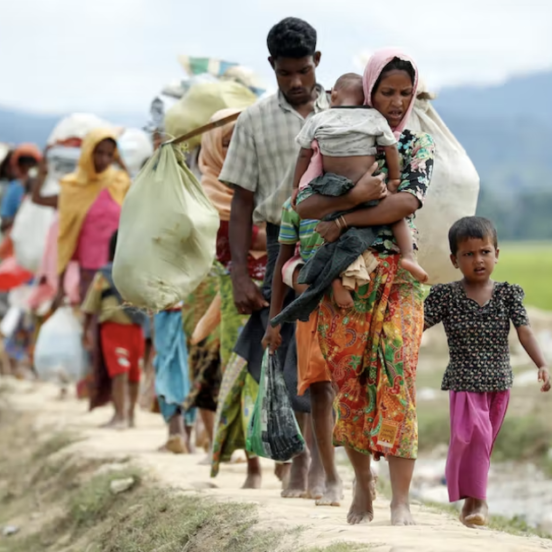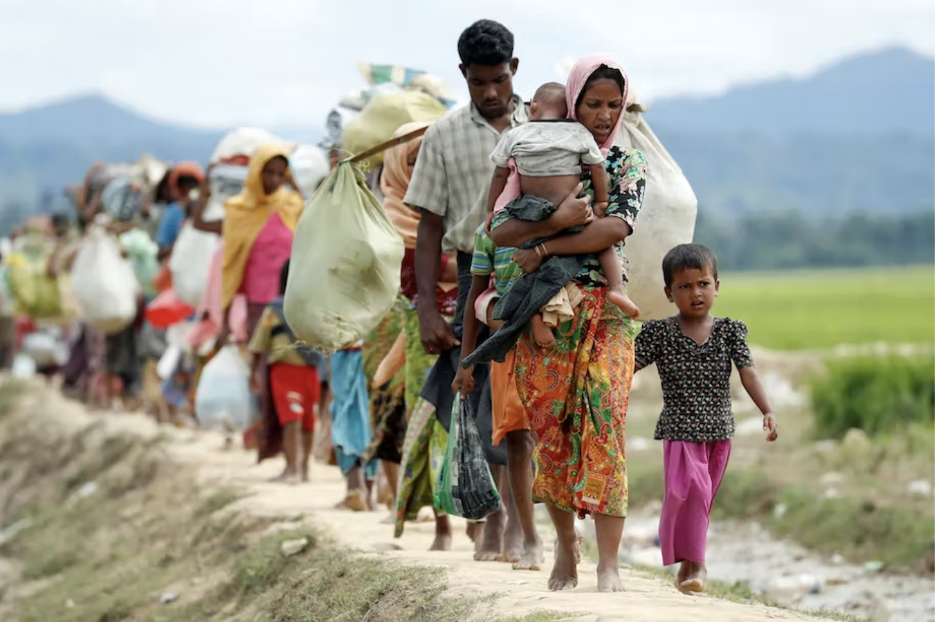Climate, Health and Equity Brief
Deadly heat, national security and nature’s disappearing act
October 23, 2022

The Climate, Health & Equity Brief is GMMB’s take on the week’s news on the current impacts of climate change. If you haven’t subscribed yet, you can do so by clicking here.
Hot Topic: Sounding the alarm. Several alarming developments this week shine a spotlight on the cascade of impacts attributable to our changing climate. First, a sobering new report from the UN and the Red Cross warns that if we fail to keep global temperature rise well below 2°C, extreme heat events will make parts of Asia and Africa uninhabitable for up to 600 million people within decades, causing large-scale suffering and loss of life, massive population displacement and further entrenched global inequality.
The report urges large and targeted investment in climate adaptation and lauds the adaptive measures some agencies are already rolling out, such as emergency housing, cooling centers, “green” roofs, early-warning systems, training for first responders, and changes to school calendars—all of which are becoming increasingly necessary in some regions.
Next, the Biden Administration released its highly anticipated national security strategy this week, making clear that the White House views the climate crisis as one of the world’s greatest security threats. The strategy underscores the need to reduce energy dependence on hostile regimes like Russia and cooperate on climate talks with rivals, particularly China. It also warns—just as the UN report did—that global tensions will further intensify as countries compete for resources and face food insecurity, health threats, climate-fueled instability, conflict, and mass migration.
And yet, there is more. One new report finds that global wildlife populations have declined by 69% in the last 50 years—evidence that we are currently living through the largest loss of life on Earth since the time of the dinosaurs. Satellite monitoring shows that human-driven deforestation destroyed 562 square miles of forest in the Brazilian Amazon last month alone, a record for September. And in Alaska, officials canceled the winter snow crab season due to a 90% plunge in the crab population—or the loss of approximately 1 billion crabs—since 2020, which scientists attribute largely to warming waters and have called a “canary in a coal mine” for other species in the Arctic ecosystem.
Yet somehow, according to the latest Washington Post-ABC News poll, just half of Americans consider climate change “very important” or “one of the most important issues” in their votes for Congress this November, even as America’s commitment to climate action—and the desperate global need for it, given our position as the largest historical emitter on the planet—hangs in the balance.
—Matt & Traci, GMMB
Programming note: The Brief will be on hiatus for the next two weeks, returning to your inbox on Saturday, November 5.
Human Health
A new report by the UN and the Red Cross found that extreme heat events will result in a “large loss of life” and make parts of the world uninhabitable for up to 600 million people this century; authors also laid ways to limit the damage of future heat waves, including “green” roofs, cooling centers, early-warning systems and more funding for local responders. (AP, France 24)
As the American West faces its worst drought in over a millennium, the small town of Coalinga, California faces an uncertain future as its sole source of water—a federally managed aqueduct—is expected to run dry within two months. (The Washington Post)
Planetary Health
The biennial Living Planet Report found the Earth’s wildlife populations have declined by 69% in the last 50 years—evidence that we are currently living through the sixth mass extinction, the largest loss of life on Earth since the time of the dinosaurs. (Guardian)
Deforestation in the Brazilian Amazon broke its monthly record for September, with an estimated 562 square miles of forest cover—25 times the size of Manhattan—destroyed last month alone, making it the worst September since monitoring began in 2015. (Barron’s)
A new study found that rain intensity is increasing across nearly every region of the U.S., confirming atmospheric scientists’ hypothesis that warmer weather leads to a wetter world due to the atmosphere’s increased ability to hold water. (The Washington Post)
The actions we take now will shape whether this decisive decade is an age of conflict and discord… or the beginning of a more prosperous and stable future.”
— U.S. National Security Advisor Jake Sulllivan
Equity
New research finds that only 17% of annual climate funding designated for protecting Indigenous land is actually invested in Indigenous communities, leading to skepticism among tribal leaders about the $1.7 billion pledged for their communities at the COP26 Climate Summit. (Grist)
As the smoke from the California wildfires spreads to Nevada, members of tribes and other rural communities that live in “care deserts” that lack local access to treatment are at elevated risk of lung disease from the hazardous air quality. (USA Today)
Politics & Economy
The Biden Administration’s new national security strategy makes clear the administration views climate change as “the existential challenge of our time” and puts it at the center of policymaking toward China, the Arctic, and many other parts of the globe. (Axios)
A new Washington Post-ABC News poll finds that roughly half of registered voters say climate change is “very important” or “one of the most important issues” in their votes for Congress this November, including 79% of Democrats, 46% of Independents, and 27% of Republicans. (The Washington Post)
Hurricane Ian has brought the cost of U.S. climate and weather disasters so far this year to more than $100 billion, with data showing that the cost and number of billion-dollar disasters have steadily risen since the 1980s due to rising temperatures, intensified storms and population growth in vulnerable areas. (Axios)
Life as We Know It
For the first time in history, the Alaska Department of Fish and Game has canceled Alaska’s winter snow crab season due to a dramatic 90% plunge in the crab population since 2020, which scientists attribute largely to warming waters and have called a “canary in a coal mine” for other species that need cold water. (CBS News)
The severe drought and dwindling water supplies impacting California, which accounts for 95% of U.S. and 35% of global tomato production, is resulting in shorter tomato growing seasons, lower crop yields and increased prices for consumers. (Axios)
A new study is calling out the lack of environmental crises featured in TV and movie scripts, with less than 0.6% of 37,000 scripts reviewed incorporating the words “climate change.” (Variety)
Action
The UN International Civil Aviation Organization set an “aspirational goal” of reaching net-zero emissions in the air travel industry by 2050 by gradually switching from kerosene-based jet fuel to biofuels, though specific targets for individual countries or airlines have yet to be set. (AP News)
An all-woman lineup of chief heat officers in seven global cities is working to improve their communities’ resilience to rising temperatures, which have caused a 56% rise in U.S. heat-related deaths between 2018 and 2021. (Fast Company)
New Zealand Prime Minister Jacinda Ardern announced plans to require farmers to pay levies for their farm animals’ emissions starting in 2025, a plan that aims to make New Zealand the first country in the world to develop a system for pricing and reducing agricultural emissions. (Axios)
A new report found that India is projected to add up to 40 gigawatts of renewable energy annually until 2030, enough to power up to 30 million more homes each year and surpass its government’s goal of producing at least 50% fossil fuel-free energy by the end of the decade. (AP News)
Kicker
Check out this fact sheet on the ways the Biden administration has bolstered the Federal Government’s resilience to the worsening impacts of climate change.
The GMMB Climate, Health & Equity Brief would not be possible without the contributions of the larger GMMB California team— Thomas, Baer, Aaron Benavides, Stefana Hendronetto, Sharde Olabanji and Quincy Tichenor, Feedback on the Brief is welcome and encouraged and should be sent to CHandEBrief@gmmb.com.






